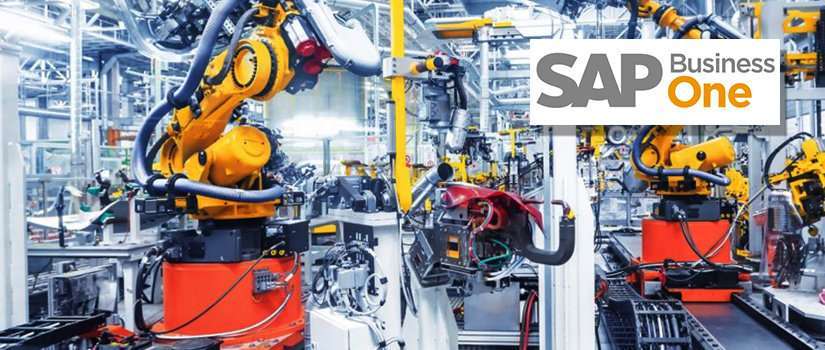Regardless of the business’s size and nature, owning an ERP Implementation is a must. This one tool can streamline tons of business fronts and enhance business productivity. Those who are looking for a comprehensive, cost-effective, and centralized ERP solution must consider SAP Business One.
From accounting to CRM, SAP Business One is capable to empower every crucial frontage. In this guide, we’re going to educate you on the nitty-gritty of SAP Business One. Whatever one needs to know about this powerful business tool is covered in this guide.
Also Read: SAP Business One for Chemical Manufacturing Industry
Referring to it beforehand will resolve loads of doubts and queries. Implementation and usage of SAP Business One will become a lot more effective and result-oriented afterward.
SAP Business One – Know about this true Game Changer
SAP Business One is a high-end ERP platform intentionally designed for small and mid-size businesses helping them to streamline key processes, gain real-time insights into business operations, and make data-driven decisions.
It comes with notable business intelligence and SAP HANA integration to empower operations. Since its development, SAP Business One is updating to meet the current industry needs. Presently, there is SAP Business One 10.0 version was launched which features cutting-edge Microsoft Office 365 integration and analytics charting capabilities.
After this upgrade, SAP Business One has become a bit more lucrative. Speaking of the deployment options available, SAP Business One is going a commendable job:
One can get its cloud deployment subscription which asks for a monthly license fee to offer all of its features. This deployment option is quick, hassle-free, and can be at your service without asking for any in-house IT assistance.
Its on-premise deployment is available granting direct control of the ERP data. With this deployment option, one can enjoy flexible reporting and internal security policies.
Users have the facility to enjoy high-end ERP capabilities from their mobile with the SAP Business One mobile app. It’s an on-the-go solution granting maximum productivity to businesses.
Key SAP Business One Modules
As there are an array of business needs, SAP Business One offers different kinds of modules to address all kinds of needs. These modules are designed to keep various business areas and can be managed on a single interface. The key SAP Business modules come in administration, resources, sales, banking, sales, inventory, financials, business partners, reports, HR, MRP, service management, project management, and production management.
Also Read: SAP B1 Implementation For Pharmaceutical And Healthcare Manufacturing Unit
SAP Business One is here to help at every business front. There is more to it. If certain needs fall out of the periphery of these modules, SAP Business One is flexible enough to customize the solution just as the business requires.
Which Are the Ideal Users of SAP Business One?
We have understood what SAP Business One means. Now, it’s time to figure out who can use it to leverage their business productivity. The decision of replacing the existing ERP system with SAP Business One depends on multiple factors. Such as:
The current accounting package fails catering the business needs and functionalities.
- Business is still running on outdated spreadsheets
- Absence of a centralized information exchange platform
- Lack of automation in the menial and repetitive tasks
- The old ERP system lacks continuity and lack of support
Organizations with employee strength of 10-100+ with $10 + million turnovers can use SAP Business One without any qualms. Multinational companies aiming to streamline branch and entity management can also leverage this tool to empower their operations, expanding its adoption beyond a specific organizational structure.
SAP Business One for Manufacturing
The manufacturing industry is highly challenging as it requires proper supply and demand management. One has to keep track of the project, raw materials purchased, timely delivery of the project, and the like business goals. Ensuring all of these factors, along with many others, can be a daunting task due to the manufacturing industry being susceptible to various external factors, such as:
- Raw material price change and shortage
- Long lead time from an overseas supplier
- Improper project scheduling
- Ineffective management of resources and raw materials
Gladly, introducing SAP Business One can curb all these and many other hurdles in a blink of an eye.
Perks of Implementation of SAP Business One
Using SAP Business One will improve the functionality of all kinds of businesses. For the manufacturing industry, this is what one can expect after SAP Business One implementation:
● Time-bound deliveries
With real-time tracking, scheduling, and optimization of each of the project-crucial aspects like availability of staff & resources, in-transit raw material delivery times, lead times, and project progress, SAP Business One ensures that no project remains overdue.
● Effective resource planning
With SAP Business One, it’s possible to manage the labor, machinery, and resources as per the demand of a specific project. Wastage can be prevented.
● Full inventor control
SAP Business One is designed to trace batch and serial numbers, manage landed costs, monitor stock levels, automatically order finished raw materials, and measure materials in multiple units. In short, there will be full control over the inventory.
Key Features To Watch Out While Utilizing SAP Business One for Manufacturing Industry
The manufacturing industry can only reap the aforementioned benefits if SAP Business One for the manufacturing industry offers sufficient supportive features. Here are some of the top-notch features that should be a part of SAP Business One while you’re utilizing it for the manufacturing industry.
1. Project & Production Management
This is a must-have feature if, as a business, one wants to stay on top of the projects by performing real-time and cross-functional reporting. This feature makes logistics management, cost accounting, controlling, and project scheduling-related tasks a lot more simplified.
2. Material Resource Planning (MRP) & Production
The manufacturing industry utilizes a wide range of materials and resources in its operations. For proper cost optimization, the effective management of materials and resources is a must. This feature performs the job with utmost perfection by auto-updating order and stock records, enabling end-to-end production controls, and handling mixed and variant production.
3. Dashboard
Get a 360-degree view of the business operations, have a detailed analysis of the key operations, and become more aware of the team functionalities as SAP Business One offers a highly customized dashboard to the end-user. With the help of this dashboard, it’s easier to have enhanced operative reporting with flexible ad-hoc queries.
4. Quality Controls
Quality is assured at various stages in the manufacturing industry. With the help of this feature, it’s easier to execute quality tests during the material flow. From the early procurement stage, quality testing can be implemented and continued throughout the project until its completion.
5. Cost Estimate
Create accurate and apt project costs with this feature. This feature can generate real-time estimates for the products/projects and can generate quotations for custom manufacturing orders. By auto-calculating profit margins for each entry, businesses can gain a detailed overview of the future outcome of a project.
6. Advanced Planning and Scheduling (APS)
This feature is bliss for the manufacturing industry as it ensures timely project delivery, Using this feature, one can easily view order times, lead times, capacity allocations, transition periods, stage of the project completion, availability of resources, and bills of materials. Delays in the operational level can be spotted early with the help of this feature.
7. Multiple Warehouse Management
Utterly optimized inventory management with facilities like tracking of remaining stock, updating the raw material price, placing the orders for out-of-stock raw material, and bin location tracking, this feature will make warehouse management an easy task.
8. Product Configurator
Use this feature to do proper management of multiple variants of the same product.
It’s not always blissful!
Just like any other thing, SAP Business One also comes with a fair share of pros and cons. Pros have been discussed above. Let’s learn about its cons.
- SAP Business One, as quoted above, is handling tons of things at a time. Because of this, the initial configuration and setup are not a piece of cake. For an organization lacking enough technical cognizance, it could be too daunting. This is why – most of the time, there is a need for an SAP Business One implementation partner or a Value Added Reseller. In each case, spending some extra bucks is a sure thing.
- When it comes to browser extension compatibility, it lacks credibility. Officially, it works only in the Mozilla Firefox browser. Chrome is not supported which is a huge negative point. Even the Mozilla Firefox extension has poor functionality. There are tons of complaints about its incompetency.
- We figured out that its ancillary system application like HR lags behind in terms of features.
- It feels good to hear that SAP Business One supports extensive customization. But when it comes to reality, this sort of complex customization can become a headache for a few. Businesses with limited functionalities can find it too cumbersome to work with.
The Final Say
SAP Business One is a cut-above business tool that everyone can bank upon blindly. For the manufacturing industry, this is just another way to leverage productivity, ensure timely project delivery, and keep the expense under control. Hence, if your old-school ERP need is pending for update or you haven’t integrated any ERP system in your manufacturing industry-related business, think of SAP Business One deployment with Stridely Solutions soon.


